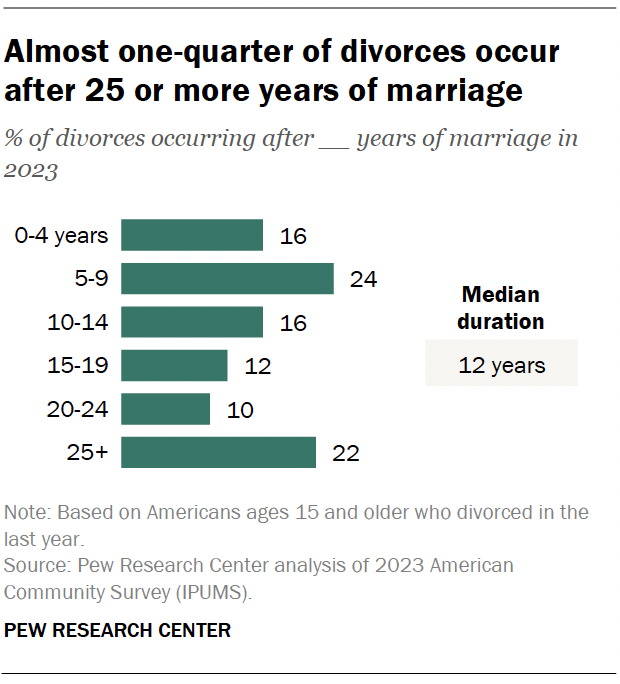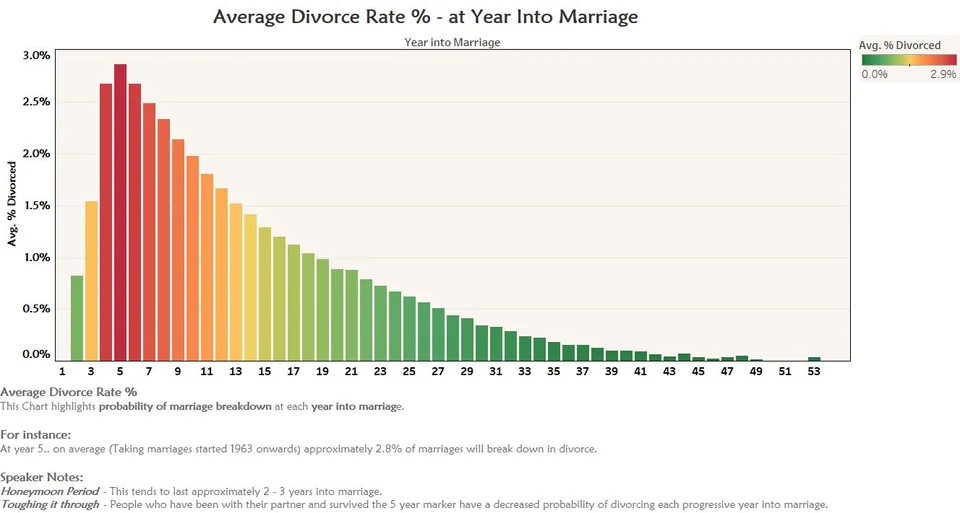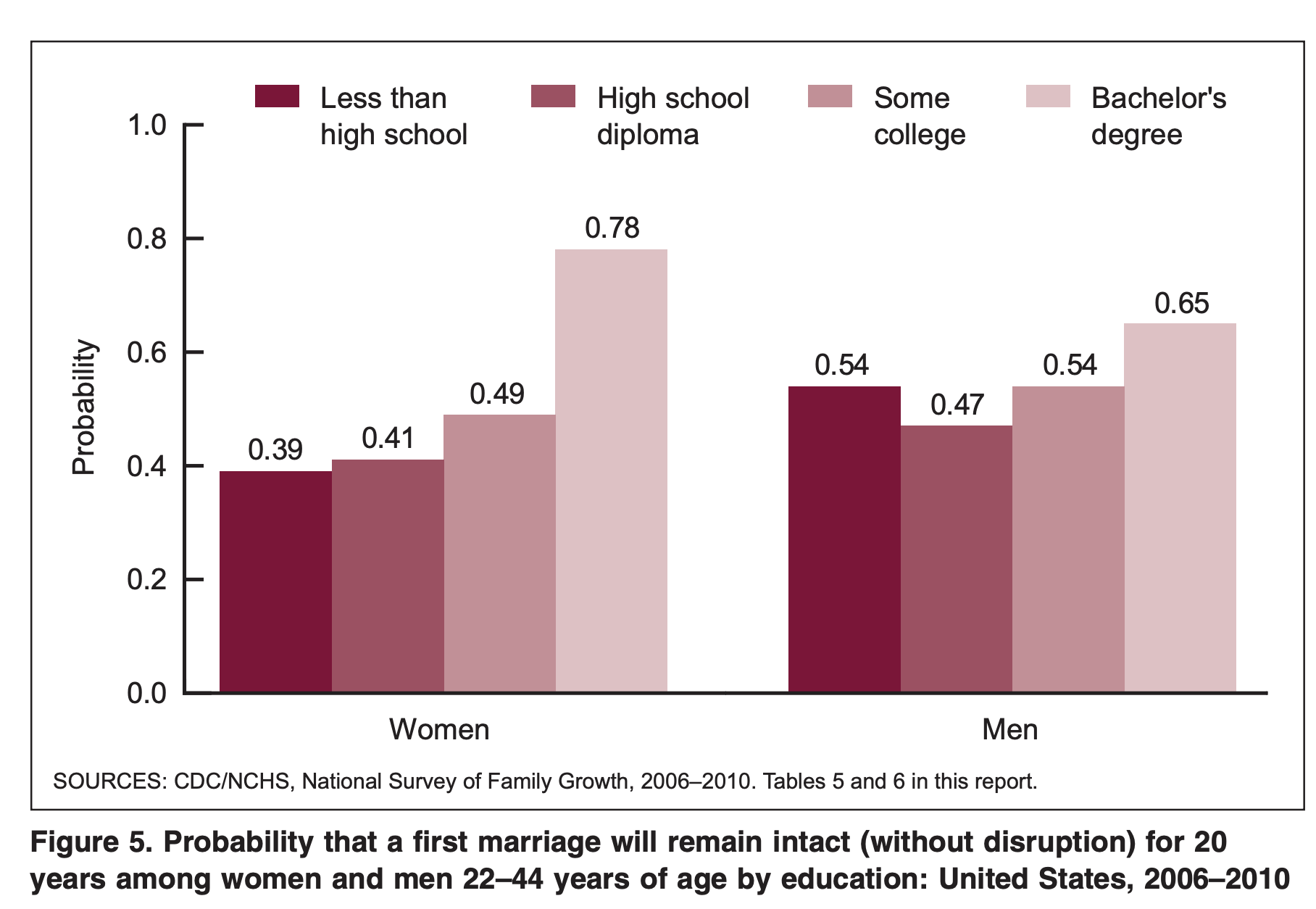
Resolves YES if, on the 5 year anniversary of our wedding, we've been together more or less continuously.
Resolves NO if we end up not getting married for whatever reason, or if we separate for a significant amount of time (eg 3+ months) after getting married.
Some context for base rates:
We met in Aug 2022, officially started dating in Oct, moved in together Jan 2023, and got engaged in Mar. Planning for a wedding in July or Aug.
I'm 28 and have a master's; she's 20, on leave from college
We currently work together building manifund.org
My parents are still together; hers are divorced
We intend to have kids, plural
See also:
People are also trading
Your fiancee (wife?) appears to be a 404 page.
I went on weird dive regarding feminism and the choices and sacrifices women have to make in their work life versus their personal life in another market.
I've seen firsthand large age gap couples fail and I will bet no till your fiancee maybe gets through college or ages past her objective "prime." Womanhood.
Obviously wishing for the best and congratulations.
I hope you guys are talking about her goals professionally and your relationship in and out of the workplace.
Are you two from similar social classes?
@ThatGuy yes we are from similar social classes.
Would be curious to see market in reference/details on the sacrifices women make in their work life. My general attitude towards that sort of thing is that it’s not a problem that women make more career sacrifices for children than men do—that’s just down to preferences/comparative advantage, and family is worth making sacrifices for. The problem is when their non-economic contributions aren’t valued, as is often the case. I also think there’s a certain type of feminist attitude which claims something like women shouldn’t make (more) career sacrifices for their children (than their male partners) and doing so is demeaning or unempowered. Imo this is just another way to of devaluing motherhood. If parenthood is valuable just like career—which I think it is, birth rates are plummeting—then saying women shouldn’t contribute more to it than their male partners is as wrong as saying they shouldn’t make more money than their male partners.
On the age gap thing, yes, I’ve also seen first hand many small age gap couples fail. I think women mature faster than men: for one, they have more career success in their twenties and are more likely to buy a house etc. at a younger age. Relatedly, if you ask a 20-year-old boy whether he wants kids he’s usually like “maybe, eventually, haven’t thought about it much”, whereas since about age 15 I've been like YES ASAP. I had boyfriends my own age before, and those relationships failed, in part because of this asymmetry.
The implication that Austin is just with me because I’m young and hot or something is very off: Austin is definitely prettier than me, and also is currently in his objective “prime” (i.e. he looks better now than when he was my age, imo). And I think the positive correlation between finishing college and marital success is because of the mutual correlations with financial stability, emotional stability, and intelligence, rather than because college causes you to be better at marriage. We have all of those other positive factors even though I haven’t finished college. (I did not leave college because I couldn’t finish or didn’t care about my career, I left because I had more exciting projects to work on.)
That is all to say, Austin and I, especially I, occupy a very strange demographic, and the stereotype that comes to mind when you think “20-year-old college drop out marries 28-year-old man and they want to have kids soon” is very far off from who we are.
(I am 21 now but was 20 when we got married)
@NoaNabeshima After some googling, I think not getting divorced in first five years has a high base rate to my surprise. Seems plausible I'm wrong about that just because that seems really surprising to me.
I think people with degrees are less likely to get divorced quickly based on a source I don't have right now, which makes me think your odds of staying together are higher.
With limited context your marriage doesn't seem clearly like it's going to lead to divorce quickly, and I imagine some couples have that, which should make your odds higher than base rates.
On the other hand, you are both young, especially Rachel, which seems like it should make the probability of you staying together lower?
Also I think you are not like the modal Americans, which should make me less confident and the probability lower.
@NoaNabeshima https://www.cdc.gov/nchs/nsfg/key_statistics/d.htm#divorce
Marital disruption at 5 years is ~21% (but this includes separation w/o divorce)
@NoaNabeshima Idk how much of the education effect is just because (older -> more education AND older -> more likely marriage won't lead to divorce) vs (person has property P -> education AND person has property P -> more likely marriage won't lead to divorce)
because the former seems like it decreases the market probability and the latter seems like it increases the market probability.
@NoaNabeshima I don't remember exactly where, but I read that only 40% of marriages remain intact when the bride is 20-25.
@NoaNabeshima Interesting graphs, surprised me too! I guess the market really should be in the high seventies / low eighties off base rates (note that separation does count for this market, so your 21% stat is measuring the right thing)
Was this meant to rhyme? It doesn't really flow lol




